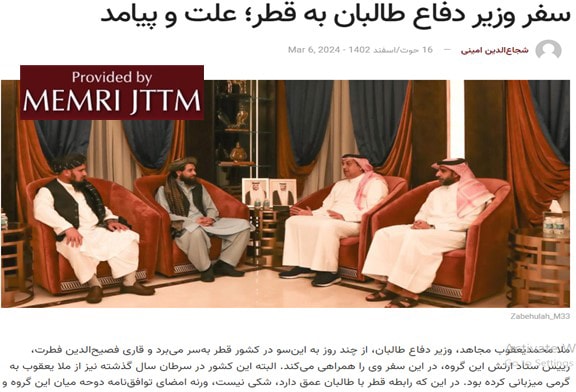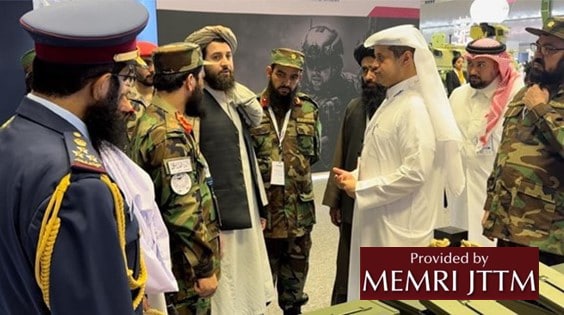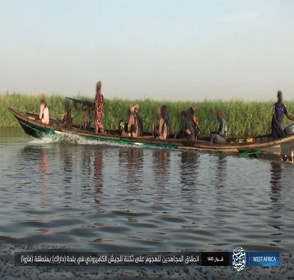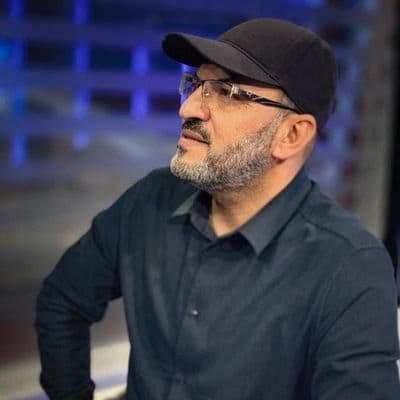The following report is now a complimentary offering from MEMRI's Jihad and Terrorism Threat Monitor (JTTM). For JTTM subscription information, click here.
On March 6, 2024, Afghan daily Hasht-e-Subh Daily published a Dari-language article analyzing the visit of Afghan Taliban's Defense Minister Mullah Yaqoob Mujahid and Chief of the Taliban Army Staff Qari Fasihuddin Fitrat to Doha, apparently to attend a military equipment exhibition. It discusses Qatar's close ties with the Taliban and suggests that Qatar may be acting at the request of the U.S. to maintain leverage over the Taliban.
The article, "The Taliban Defense Minister's Trip To Qatar – Reason And Consequence," notes that Mullah Yaqoob Mujahid is seen as pragmatic when compared with Taliban Emir Hibbatullah Akhundzada, but argues that Qatar is following an erroneous path, and that the Taliban do not listen to world opinion.
The article highlights Qatar's continuing role in facilitating open and secret talks between the U.S. and the Taliban, in addition to its vital role in facilitating the Doha agreement of 2020. It suggests that the Joe Biden administration might be concerned about the Taliban's cordial relations with neighboring countries and some regional powers.
The independent non-profit Hasht-e-Subh Daily is the most popular newspaper in Afghanistan and was founded in June 2007 by prominent Afghan journalists and human rights defenders. Its website publishes reports, editorials, interviews, and news about Afghanistan and the world in Pashto, Dari, and English.

A screenshot of the article
Following are translated excerpts from the article:
"Mohammed Bin Abdulrahman Bin Jassim Al Thani, The Prime Minister And Foreign Minister Of Qatar, Was The First Foreign Official To Have Met With Mullah Hibbatullah Akhundzada, The Leader Of The Taliban"
"Mullah Mohammad Yaqoob Mujahid, the Minister of Defense of the Taliban, has been in Qatar for several days, and Qari Fasihuddin Fitrat, the Chief of Army Staff of this group, is accompanying him on this trip [March 3-7, 2024]. Of course, this country had warmly hosted Mullah Yaqoob in the month of Saratan last year [i.e., July 2022].
"There is no doubt that Qatar's relationship with the Taliban is deep, otherwise the signing of the Doha Agreement between this group and the United States would not have been possible. It was exactly Qatar's day-and-night struggle that got the parties to sign the treaty.
"Afghanistan, under the administration of the Taliban, has been in the focus of Doha's attention for the past two and a half years. Qatar hosted the largest international meeting centered on the United Nations on Afghanistan on two occasions in this Shamsi year [i.e., March 2023-March 2024]. It has also hosted the U.S. and Taliban representatives for face-to-face talks on four occasions.
"Mohammed bin Abdulrahman bin Jassim Al Thani, the prime minister and foreign minister of Qatar, was the first foreign official to have met with Mullah Hibbatullah Akhundzada, the leader of the Taliban, in the month of Sawr of 1402 Hijri Shamsi [i.e., May 2023] in the city of Kandahar, and perhaps they have talked about very important topics..."
"It Seems That Mullah Yaqoob Is A Favorable Option [For Qatar To Work With] Compared To Others Because He Is Called 'Pragmatic' And More Importantly He Is The Son Of The Founder Of The Taliban [Mullah Mohammad Omar]"
"Regarding Qatar's hosting of the Taliban Defense Minister, attention to a few points may not be without benefit:
"1. It is possible that Qatar is not pursuing a specific goal by inviting Taliban officials and has agreed to this task at the request of the U.S., as it is said that its prime minister carried Washington's message to Mullah Hibbatullah Akhundzada during his trip to Kandahar. If so, it can be claimed that Joe Biden's administration is concerned about the Taliban's seemingly warm relationship with its neighbors and some countries in the region. America, which seeks to gain the satisfaction of the Taliban, is trying not to be left without a share. So, by using the mediation power of Qatar, it tries to satisfy at least one branch of the Taliban...

Mullah Yaqoob Mujahid with Qatari officials; he also met with the Qatari emir
"It seems that Mullah Yaqoob is a favorable option compared to others because he is called 'pragmatic' and more importantly he is the son of the founder of the Taliban [Mullah Mohammad Omar]. According to some published reports, unlike the United States, the countries of the region, especially the Islamic Republic of Iran, have a secret friendship with the leader of the Taliban and other extremist figures of this group.
"There were even reports that Mullah Hibbatullah Akhundzada is planning to create an armed force similar to the Islamic Republic of Iran's Revolutionary Guards for the purpose of protecting himself. The truth of this claim has not been clarified yet. If this is the case, in the future the Taliban may actually become two branches in the hands of two opposing forces."
"If The United States And Its Allies Intend To Put Pressure On The Taliban, One Option Is To Pay The Forces [Like Mullah Yaqoob Mujahid] That Are Called Pragmatic"
"2. Apart from the above issue, Qatar and America may use Mullah Yaqoob as a tool of pressure on Mullah Hibbatullah Akhundzada because he has not failed to meet the demands of Western states. Maybe [Akhundzada] wants to implement what he said addressing the world at the meeting of Islamic religious scholars at the Loya Jirga Hall: 'I am not to command you, nor do I accept your commands, nor do I go one step forward with them, nor do I interact with them, nor do I deal with them. Now that you have used the mother of bombs, even if you use atomic bombs, I will not give up.'
"The recent public executions, which are said to have been carried out on the order of the Taliban leader [Akhundzada], have angered the Western world and the United Nations. There is still no news about opening the gates of schools and universities to girls and women, and removing other restrictions. The media and human rights organizations are publishing reports from the Taliban prisons these days, which show the condition of the prisoners to be extremely dire and pitiful.
"If the United States and its allies intend to put pressure on the Taliban, one option is to pay the forces [like Mullah Yaqoob Mujahid] that are called pragmatic. Kindness to the pragmatists leads to unkindness to the extremists, and this can create a breach in the ranks of the Taliban in the future. Of course, it is not clear whether the desirable figures for Qatar and America are pragmatic figures or not. It is only said that some Taliban figures do not agree with the strict decisions of their leader, while this same congregation called many times in passionate speeches that violating the command of the Emir-ul-Momineen [Akhundzada] deserves severe punishment.
"If the claims about the isolation of the Kabul-based Taliban [such as Mullah Yaqoob Mujahid] by the leader of this group [Mullah Hibbatullah Akhundzada who is based in Kandahar] are true, it is likely that Qatar has entered the field and is making efforts to include them in the text of important decisions because it has hosted them for many years and has facilitated their conversation with the Americans. For now, it is not clear whether the option of using the pragmatic Taliban against the extremist Taliban will be implemented or not. If it is implemented, it will give result or not. The passage of time will clarify this..."
"Qatari Authorities May Explain To Mullah Yaqoob Mujahid To Stop Being Obstinate And Prepare To Attend The Next Meeting [UN In Doha], Even If The Conditions They Raised Are Not Accepted"
"3. In the meeting held by the United Nations in Doha at the end of the month of Dalwa [February 2024], the Taliban said no to the request of the United Nations and refused to participate in it. According to the testimony of the guests of that meeting, the Taliban's participation would have been better than their non-participation, hoping that maybe a result could have been obtained from the meeting. It was clear that the Taliban's non-participation will not cause the world to turn away from this group. At that time, the representatives of some countries, especially the United Nations, expressed hope that the Taliban would participate in the next meetings...

Mullah Yaqoob Mujahid and Qari Fasihuddin Fitrat inspect the military equipment exhibition
"Antonio Guterres, the Secretary General of the United Nations, attended the press conference at the end of that meeting. A reporter asked him, if another meeting is held in Doha in the future and once again the Taliban do not participate, what will your position be? He answered that he hopes that some countries will be able to convince the Taliban by then.
"Exactly, Qatar is one of the desirable countries in Guterres's opinion because it is the host of the next meetings and still has a good relationship with the Taliban. Qatari authorities may explain to Mullah Yaqoob Mujahid to stop being obstinate and prepare to attend the next meeting, even if the conditions they raised are not accepted."
"Doha's Hosting Of The Taliban's Defense Minister Instills The Impression In The Viewer's Mind That The World Needs Interaction With The Taliban, Not Necessarily The Taliban Need The World"
"4. Regarding the presence of Badakhshani Talib [Qari Fasihuddin Fitrat] next to Mullah Yaqoob Mujahid, there are two points: firstly, he has been intelligently chosen to escort the minister of defense so that the world will know that the regime of this group is so-called inclusive. While in Mullah Yaqoob Mujahid's previous trips to Qatar and the United Arab Emirates, Fasihuddin Fitrat was absent from the scene.
"Second, since the trip of these two Taliban officials was apparently made with the intention of participating in the Doha International Defense Industry Exhibition (DIMDEX), Fasihuddin Fitrat, who is the Chief of Staff of the Army, can attend it. Of course, the participation of these two Taliban officials in the exhibition tells about the appearance of the issue, not its interior. It can be assumed that Fasihuddin Fitrat's eyes will be staring at the Doha exhibition and Mullah Yaqoob Mujahid as the main figure, may have important meetings behind the scenes with the Qatari and American sides; something that was common during the governments of Hamid Karzai and Mohammad Ashraf Ghani.

Mullah Yaqoob Mujahid has met with Qatari emir twice on two visits
"5. If Qatar, by hosting the Taliban, seeks to convince this group to meet the world's expectations, it is wrong. Experience has shown that every time the Taliban have received diplomatic privilege, they have dominated the people more strictly than before. Mullah Yaqoob Mujahid's trip to Qatar also caused a stir because the Taliban avoided participating in the second round of the Doha meeting despite being invited.
"The prevailing opinion was that... perhaps the United States and its regional allies would no longer simply open their arms to this group; now Qatar has acted contrary to that idea. If the Taliban refrain from participating in the meeting despite the insistence of the hosts, it may be better to think of an alternative option [to anti-Taliban opposition groups] instead of continuing the ineffective invitation to this group.
"Doha's hosting of the Taliban's defense minister instills the impression in the viewer's mind that the world needs interaction with the Taliban, not necessarily the Taliban need the world. A few days ago Mawlawi Abdul Kabir, the political deputy of the Taliban Prime Minister, claimed in a meeting in Kabul that the world has no choice but to interact with the Taliban Emirate because, according to him, there is no alternative force: 'We call on the world that you have no other way but to interact with [the Taliban], because if you do not interact with [the Taliban], with whom are you going to interact?'"
Source: 8am media (Afghanistan), March 6, 2024. The article, in its English version, has been standardized for clarity.
The full text of this post is available to subscribers.
Please login or register to request subscription information from MEMRI





